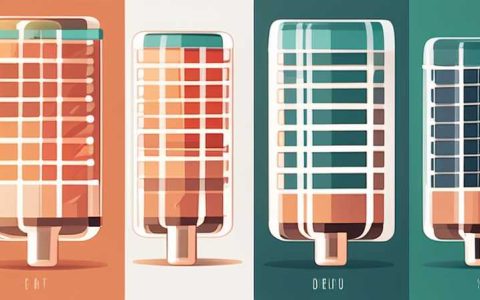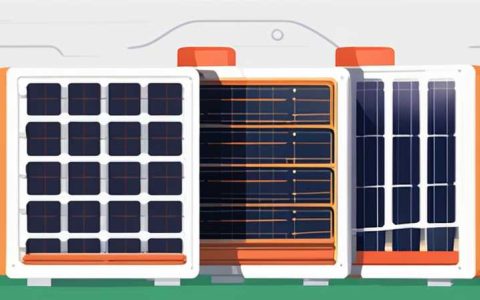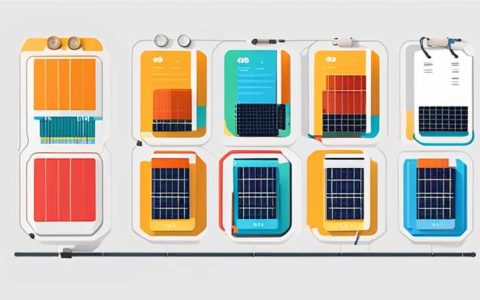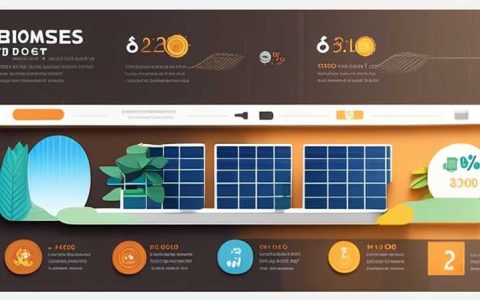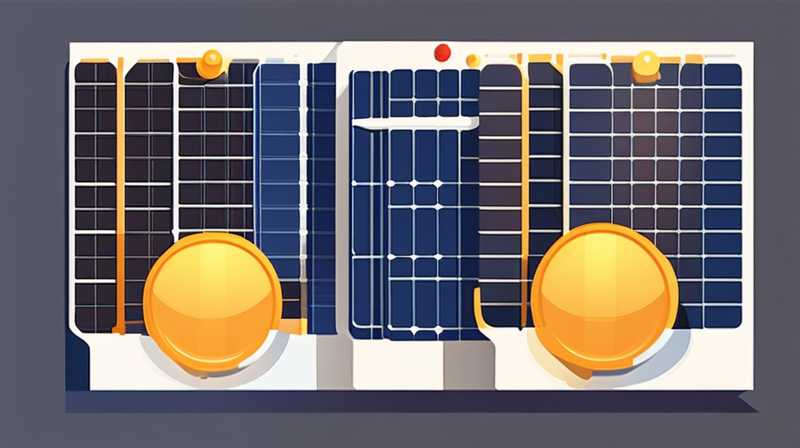
1. Understanding Solar Panel Cleaners: 3 Key Types, Appropriate Properties, Effectiveness in Cleaning
2. Solar Panel Cleaners Must Be Non-Abrasive, Environmentally Friendly,
3. Regular Maintenance Ensures Optimal Efficiency of Solar Panels,
4. Many Commercial Cleaners Are Available with Varying Formulations.
Solar panels require specific cleaning solutions to ensure they operate efficiently without damage. Choosing the appropriate cleaning agent involves understanding the different types of cleaners available, the properties they should have, and how often to use them. Opting for non-abrasive and environmentally friendly cleaners is crucial to avoid scratching the solar glass while also being gentle on the ecosystem. Additionally, while considering commercial formulas versus DIY options, it is important to understand the specific needs based on the environmental factors where the solar panels are installed.
1. TYPES OF SOLAR PANEL CLEANERS
Selecting an appropriate cleaner for solar panels requires insight into various solutions tailored for this purpose. The primary categories may generally be classified into three distinct groups: commercial cleaning agents, DIY solutions, and water purification products. Each option serves its respective market, accommodating unique user preferences and requirements.
1.1 Commercial Cleaning Agents
Commercially available cleaners designed specifically for solar panel surfaces often demonstrate superior performance. These formulations possess specific components that enable them to effectively dissolve grime, bird droppings, and other contaminants that may hamper light absorption. Not only do these products promise to clean optimally, but they also ensure minimal risk of damage to the panels themselves.
A notable advantage of commercial cleaners is their convenience. They can be purchased easily from numerous retailers or online outlets, making them readily accessible to everyone looking to maintain their solar systems. However, not all options are created equal. It is imperative to analyze the ingredients to ensure non-abrasive properties, which prevent scratches on the delicate glass surface of the solar panel. Furthermore, eco-friendly formulations are also widely available, benefitting not just the panels, but also the environment.
1.2 DIY Cleaning Solutions
For individuals inclined towards more economical alternatives or those who prefer a hands-on approach, do-it-yourself cleaners can serve as effective substitutes. Common DIY solutions include a simple mixture of water with a small amount of mild soap or vinegar, combined with a soft cloth or sponge to aid in cleaning without causing any abrasion. These options are often cost-effective and can be created with ingredients readily found in most households.
Nonetheless, users should exercise caution when opting for DIY cleaning solutions. The effectiveness of such methods varies widely, and improper proportions may not yield desired outcomes. Furthermore, using overly harsh cleaning agents, including bleach or ammonia, can damage solar panels irreparably. Therefore, maintaining a careful balance while utilizing DIY cleaning remedies is paramount in preserving the efficiency of solar energy systems.
2. PROPERTIES OF AN IDEAL SOLAR PANEL CLEANER
Effective cleaning of solar panels requires consideration of what constitutes the ideal solution. Understanding the prominent properties that a good solar panel cleaner should present is necessary for ensuring durability and effectiveness. These properties encompass non-abrasiveness, eco-friendliness, ease of application, and a proven track record of efficacy against stubborn stains.
2.1 Non-Abrasiveness
The selection process should prioritize cleaners that are non-abrasive to avoid scratching or damaging solar panels. The solar glass surface is delicate and designed to capture sunlight effectively; thus, any scratching can lead to decreased efficiency or irreversible harm. Non-abrasive cleaners ensure that the panels remain intact while restoring their clarity.
Moreover, non-abrasive cleaners help maintain the overall integrity of the solar installation. Scratched or damaged panels not only perform poorly, but they can also lead to more significant issues down the line, like water damage from sections of the panel becoming less sealed. Therefore, employing solutions explicitly branded as safe for such surfaces is highly advisable.
2.2 Eco-Friendliness
As awareness of environmental issues continues to grow, so too does the demand for cleaner solutions that are gentle on the planet. Eco-friendly cleaners have become increasingly popular for those concerned about the harmful effects of toxic substances on ecosystems. Using biodegradable formulations alleviates the burden on the environment while providing an effective cleaning experience. This consideration is especially important when cleaning solar panels, as runoff can easily reach nearby flora and fauna.
Additionally, many environmentally friendly products utilize naturally derived ingredients, often making them safer for users and attractive to eco-conscious consumers. By opting for eco-friendly solutions, one not only mitigates environmental impact but also reinforces a commitment to sustainability, aligning with the underlying principles of utilizing renewable energy in the first place.
3. FREQUENCY OF CLEANING SOLAR PANELS
Determining the optimal frequency for cleaning solar panels hinges on several factors, including the geographical location, environmental conditions, and seasonal variations. Each context contributes to how often these systems require maintenance to maximize functionality and lifespan.
3.1 Environmental Factors
For solar installations situated in arid regions or areas prone to significant dust accumulation, increased frequency may be necessary. Dusty conditions can lead to a rapid buildup of grime that obstructs sunlight, necessitating regular cleaning to maintain optimal energy output. Conversely, regions with frequent rainfall may experience less need for cleaning, as rain naturally rinses away debris that settles on the panels.
Moreover, urban setups, particularly those near industrial and mineralized sites, might also require more frequent attention due to pollutants. Pollutions from nearby factories or heavy traffic can impact solar panel cleanliness significantly and generally require more proactive cleaning strategies. Thus, assessing the surrounding environment becomes critical in establishing a maintenance routine that effectively preserves the solar panel’s efficiency.
3.2 Seasonal Variations
Weather patterns play a pivotal role in determining cleaning frequency. Seasonal changes can dictate how quickly debris accumulates, influencing decisions about maintenance schedules. For instance, winter months may result in snow or ice buildup, requiring care when cleaning, while spring could necessitate more attention due to pollen and other growths from blooming vegetation.
Understanding these variables allows solar panel owners to create an effective cleaning strategy that aligns with their specific needs throughout the year. Observations during different seasons can provide insights into how often solar panels may benefit from additional cleaning sessions without compromising their durability or function.
4. COMMERCIAL SOLAR PANEL CLEANING OPTIONS
In the growing market of solar energy, an array of commercial cleaning products caters to the needs of solar panel owners. These solutions range from ready-to-use sprays to concentrated formulations that need dilution prior to application. Understanding the various commercial options can guide consumers towards selecting an appropriate cleaner that meets their requirements.
4.1 Pre-Mixed Sprays and Solutions
Pre-mixed cleaning sprays provide convenience for individuals who prefer efficiency and straightforward usage. Most ready-to-use products are formulated specifically for solar panels, containing all necessary components to effectively rid panels of dirt and debris without damaging the delicate surfaces. These solutions are often easy to apply, as they require minimal prep work and can be sprayed directly onto the panels, followed by wiping with a soft cloth or sponge.
However, despite their convenience, pre-mixed products can sometimes come at a premium price point. Hence, it is worth considering whether the convenience offsets potential higher costs, especially in larger installations where extensive cleaning might incur substantial expenditures over time.
4.2 Concentrated Solutions
Concentrated formulations present a cost-efficient alternative. These products require dilution before application, often leading to a more versatile use in both cleaning solar panels and general maintenance needs throughout the household. Concentrated solutions are generally perceived as economical by providing value for buyers, as a smaller quantity can often yield more significant results when appropriately diluted.
Moreover, choosing concentrated cleaning agents allows consumers to tailor their cleaning ratios depending on specific cleaning requirements, enabling varied levels of strength against different types of soil or accumulation. Thus, versatility and adaptability make concentrated options appealing to those managing multiple cleaning applications.
5. STORING AND HANDLING SOLAR PANEL CLEANERS
Proper storage and handling of solar panel cleaning agents are vital for preserving their effectiveness and ensuring user safety. Understanding recommended practices enhances the lifespan of these products and maintains their intended effectiveness over time.
5.1 Temperature and Conditions
Most cleaning agents should be stored in a controlled environment, away from extreme temperatures and direct sunlight. High heat or humidity can degrade the effectiveness of chemical constituents, compromising the overall cleaning ability of the products. Therefore, it is advisable to follow manufacturer instructions for proper storage conditions closely.
Additionally, exposure to moisture can create an environment conducive to bacterial growth or chemical degradation. Thus, ensuring that containers remain sealed and protected from elements contributes to the longevity and reliability of chosen cleaning alternatives.
5.2 Safety Protocols
Implementing safety protocols when handling cleaning solutions is essential for preventing accidents and injuries. Always utilizing gloves, goggles, or other protective gear can safeguard users from potential chemical exposure. Furthermore, consulting and adhering to manufacturer instructions ensures compliance with safety measures aimed at promoting user well-being during application.
Regularly reviewing safety data sheets for purchased products can also enhance familiarity with potential hazards and appropriate responses in the event of unintended accidents. By imparting diligent care and proper handling of cleaning solutions, users prioritize safety while maintaining solar panel efficacy.
FREQUENTLY ASKED QUESTIONS
WHAT IS THE BEST TIME TO CLEAN SOLAR PANELS?
The optimal timing for cleaning solar panels generally aligns with cooler parts of the day, such as early morning or late afternoon. This timing helps prevent cleaning solutions from evaporating too quickly, which could result in streaks or uneven cleaning. Moreover, cleaning during such periods reduces the risk of slipping or falling on potentially wet surfaces. Additionally, monitoring weather patterns is advisable, as avoiding cleaning during rainy seasons or immediately after rainfall enables natural cleansing while ensuring lower dirt accumulation. When conducting the cleaning process, users should also take note of wind conditions that may affect the dust and debris levels around the panels. Understanding these elements can ensure that cleaning routines are effective and do not become redundant shortly after application.
IS IT SAFE TO USE REGULAR HOUSEHOLD CLEANING PRODUCTS ON SOLAR PANELS?
The safety of using regular household cleaning agents on solar panels is generally questionable. Many common household products, like ammonia or bleach, pose a risk to the integrity of solar panel surfaces. These chemicals can lead to unwanted scratches, degradation of protective coatings, or even voiding warranties provided by solar manufacturers. Instead, opting for gentle, non-abrasive solutions is crucial for maintaining panel performance without compromising structural integrity. Thus, it is always prudent to choose cleaners specifically formulated for solar installations to achieve the desired cleaning effects while ensuring long-term safety and durability of the panels.
SHOULD SOLAR PANELS BE CLEANED MORE FREQUENTLY IN URBAN AREAS?
In urban settings, the answer is typically affirmative when it comes to cleaning frequency for solar panels. Proximity to heavy traffic, dust, industrial pollution, and other pollutants can significantly impact the cleanliness of solar surfaces. These environments usually lead to the accumulation of grime more rapidly, potentially resulting in diminished efficiency in energy absorption. Regular inspections and cleaning may be necessary to prevent long-term efficiency losses. Monitoring surrounding conditions and adjusting cleaning schedules accordingly helps ensure that the solar systems maintain optimal performance despite environmental challenges. Therefore, maintaining a proactive cleaning strategy in urban areas can be instrumental in maximizing energy output.
Regular maintenance of solar panels not only preserves their appearance but also enhances their overall function, contributing to increased efficiency and lifespan. Selecting the right cleaner is essential in this process; thus, understanding the types of cleaners available, their properties, and best practices in cleaning ultimately leads to informed decisions. This attention to detail guarantees that solar installations operate optimally in the long run, adhering to the principles of sustainability while providing the energy efficiency they were designed for. Taking the time to investigate cleaning solutions thoroughly and aligning them to specific situations fosters a commitment to both environmental conscientiousness and adherence to renewable energy values.
Original article by NenPower, If reposted, please credit the source: https://nenpower.com/blog/what-kind-of-cleaner-should-i-use-for-solar-panels/




